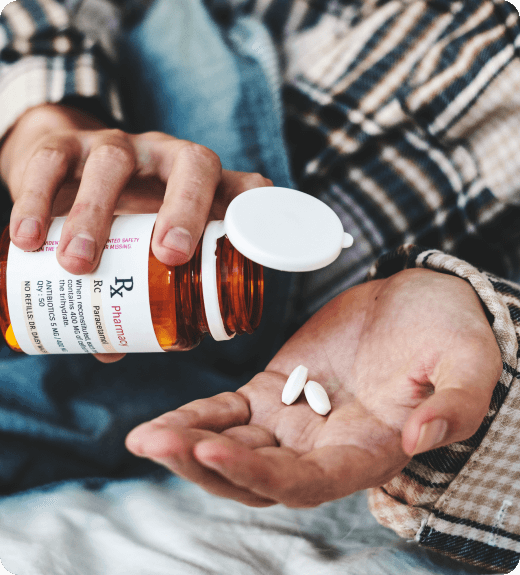
The opioid crisis in America
The opioid crisis in America, encompassing both heroin and prescription drugs, is devastating families and impacting communities nationwide. Effective treatment for opioid addiction requires the expertise of a professional detox and rehabilitation center due to the drug’s powerful hold on its users and the severity of withdrawal symptoms. At Silver Linings Recovery Center, we understand the complexities of opioid addiction and provide comprehensive treatment programs to help individuals reclaim their lives.
What Are Opioids?
Opioids are a class of drugs that include both prescription medications and illegal substances, primarily used for their pain-relieving properties. They work by binding to specific receptors in the brain, spinal cord, and other areas of the body, reducing the perception of pain and producing a sense of euphoria. Common prescription opioids include medications such as oxycodone, hydrocodone, and morphine, which are often prescribed to treat severe pain following surgery or injury. However, opioids also include illicit drugs like heroin, which is known for its high potential for addiction and abuse. While effective for pain management, opioids carry significant risks, including dependence, addiction, overdose, and death, particularly when misused or taken without medical supervision. The misuse of opioids has led to a widespread public health crisis, necessitating comprehensive efforts for prevention, treatment, and recovery support.
Signs of Opioid Addiction
Physical Signs
- Drowsiness or lethargy: Frequently falling asleep or appearing excessively tired.
- Constricted Pupils: Noticeably smaller pupils compared to the norm.
- Slurred Speech: Difficulty speaking clearly or coherently.
- Unusual Weight Changes: Significant weight loss or gain.
- Constipation: Persistent difficulty with bowel movements.
- Nausea or Vomiting: Frequent episodes of feeling sick or throwing up.
- Poor Personal Hygiene: Neglect of grooming or personal care.
- Skin Changes: Itching or rash, and, in some cases, skin infections or abscesses from needle use.
Behavioral Signs
- Increased Tolerance: Needing larger doses to achieve the same effect.
- Secretive Behavior: Avoiding conversations about drug use or hiding substances.
- Mood Swings: Dramatic shifts in mood, including irritability or euphoria.
- Neglecting Responsibilities: Failure to fulfill work, school, or family obligations.
- Social Withdrawal: Isolating from friends and family or avoiding social activities.
- Financial Problems: Spending excessive amounts of money on opioids or experiencing sudden financial difficulties.
Psychological Signs
- Craving: Persistent and intense desire to use opioids.
- Obsessive Thoughts: Preoccupation with obtaining and using opioids.
- Impaired Judgment: Making poor decisions or engaging in risky behaviors.
- Denial: Refusal to acknowledge the extent of the problem or its impact.
Signs of Withdrawal
- Restlessness: Increased agitation or inability to stay still.
- Sweating: Excessive sweating or clammy skin.
- Muscle Aches: Generalized body pain or discomfort.
- Runny Nose or Yawning: Persistent cold-like symptoms.
- Insomnia: Difficulty falling or staying asleep.
Recognizing these signs early can be crucial for getting timely help and treatment for opioid addiction. If you or someone you know is showing these symptoms, seeking professional assistance can provide the support needed for recovery.
Detox & Opioid Addiction Treatment Options
The journey to overcoming opioid addiction begins with detoxification, a critical first step in achieving long-term recovery. Detoxing from opioids can be a challenging and uncomfortable process, characterized by severe withdrawal symptoms such as intense pain, anxiety, and discomfort. For this reason, it is highly advisable to undergo detox at a professional treatment center, where experienced medical professionals can provide the necessary support and care. At Silver Linings Recovery Center, we offer a safe and supportive environment for detoxification, with 24/7 monitoring by a team of nurses and medical experts to ensure your safety and comfort throughout the process.

Medication-Assisted Treatment (MAT) for Opioid Addiction
Medication-Assisted Treatment (MAT) plays a crucial role in managing opioid addiction and supporting long-term recovery. MAT involves the use of FDA-approved medications to help reduce cravings, alleviate withdrawal symptoms, and prevent relapse. At Silver Linings Recovery Center, we utilize medications such as methadone, buprenorphine, and Probuphine, which have been shown to be effective in treating opioid dependence. Our medical staff will work with you to determine the appropriate medication and will typically recommend a course of MAT lasting 6 to 12 months. This approach not only aids in the detoxification process but also provides ongoing support as you transition to the next phases of recovery.
Residential/Inpatient Treatment Program
Our Residential or Inpatient Treatment Program offers an intensive and immersive approach to opioid addiction treatment. Clients reside at our facility for an extended period—usually 30, 60, or 90 days—during which they receive comprehensive care and support. This program includes structured daily routines, individual and group therapy, life skills development, and holistic therapies. After completing the inpatient program, clients may be recommended to move into a recovery house to facilitate a smoother transition back into daily life, providing continued support and stability.
Partial Hospitalization Program (PHP)
For those who require a slightly less intensive level of care, our Partial Hospitalization Program (PHP) offers a balanced approach. Clients attend our facility for 8 hours a day, 5 to 6 days a week, receiving a combination of group therapy, individual therapy, family support, and alternative therapies such as art therapy. This program provides a structured environment while allowing clients to return home in the evenings, making it an effective option for those who need a high level of care but require some degree of flexibility.
Intensive Outpatient Program (IOP)
The Intensive Outpatient Program (IOP) is designed for individuals who may not be able to commit to full-time residential treatment due to work or family responsibilities. IOP provides a structured treatment schedule with sessions typically held several times a week. This program includes individual and group therapy, and focuses on building coping skills and addressing underlying issues. It offers a flexible yet comprehensive approach to treatment, helping clients manage their recovery while balancing other aspects of their lives.
General Outpatient Program
For those seeking the most flexible treatment option, our General Outpatient Program offers a range of scheduling possibilities. Clients work with a recovery specialist to create a personalized treatment plan, attending sessions from once a week up to five times per week based on their needs and availability. This program is ideal for individuals who need ongoing support while maintaining their daily responsibilities.
Finding the Path to Recovery
No matter which treatment option you choose, Silver Linings Recovery Center is dedicated to guiding you through the recovery process and helping you overcome opioid dependency. Our comprehensive treatment programs are designed to meet a variety of needs and provide the support necessary for a successful recovery. If you or a loved one is struggling with opioid addiction, don’t hesitate to reach out for help. Call us at 1-855-960-3719 to learn more about our programs and take the first step towards a healthier, drug-free life. We are here to support you every step of the way.